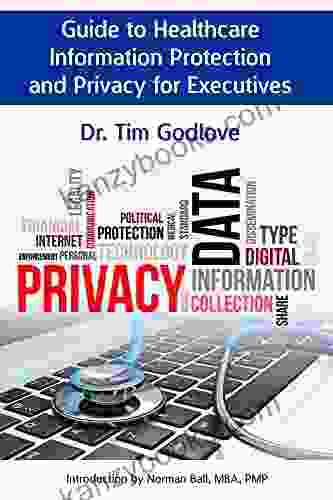Guide to Healthcare Information Protection and Privacy: A Vital Resource for Executives

In today's digital age, healthcare organizations hold vast amounts of sensitive patient information. This data is vulnerable to a wide range of threats, including data breaches, cyberattacks, and insider threats. It is essential for healthcare executives to understand the risks and take steps to protect their organizations from these threats.
This guide provides a comprehensive overview of healthcare information protection and privacy. It covers the following topics:
5 out of 5
| Language | : | English |
| File size | : | 743 KB |
| Text-to-Speech | : | Enabled |
| Screen Reader | : | Supported |
| Enhanced typesetting | : | Enabled |
| Print length | : | 322 pages |
| Lending | : | Enabled |
- The legal and regulatory landscape of healthcare information protection
- The different types of threats to healthcare information
- The best practices for protecting healthcare information
- How to respond to a data breach
This guide is essential reading for healthcare executives who want to protect their organizations from the risks of data breaches and cyberattacks. It provides practical advice and guidance that can help organizations to improve their information security posture.
The Legal and Regulatory Landscape of Healthcare Information Protection
The legal and regulatory landscape of healthcare information protection is complex and constantly evolving. There are a number of federal and state laws that govern the collection, use, and disclosure of healthcare information. The most important of these laws is the Health Insurance Portability and Accountability Act (HIPAA). HIPAA was enacted in 1996 to protect the privacy of health information. It sets forth a number of requirements for healthcare organizations, including:
- The requirement to implement reasonable and appropriate safeguards to protect healthcare information from unauthorized access, use, or disclosure
- The requirement to provide patients with a notice of privacy practices that describes how their health information will be used and disclosed
- The requirement to obtain patient consent before using or disclosing their health information for marketing purposes
In addition to HIPAA, there are a number of other federal and state laws that govern the collection, use, and disclosure of healthcare information. These laws include:
- The False Claims Act
- The Federal Trade Commission Act
- The Gramm-Leach-Bliley Act
- The Sarbanes-Oxley Act
Healthcare organizations must be aware of all of these laws and regulations in Free Download to ensure that they are in compliance. Failure to comply with these laws can result in significant fines and penalties.
The Different Types of Threats to Healthcare Information
There are a number of different threats to healthcare information, including:
- Data breaches: Data breaches can occur when unauthorized individuals gain access to healthcare information. This can happen through a variety of means, such as hacking, phishing, or social engineering.
- Cyberattacks: Cyberattacks are malicious attempts to damage or disrupt healthcare information systems. These attacks can be carried out by hackers, criminals, or even nation-states.
- Insider threats: Insider threats occur when employees or contractors misuse or disclose healthcare information. This can be done intentionally or unintentionally.
Each of these threats poses a serious risk to healthcare organizations. It is important to understand the risks and take steps to protect your organization from these threats.
The Best Practices for Protecting Healthcare Information
There are a number of best practices that healthcare organizations can follow to protect healthcare information. These best practices include:
- Implement strong security controls: Healthcare organizations should implement strong security controls to protect their information systems from unauthorized access. These controls should include firewalls, intrusion detection systems, and anti-malware software.
- Educate employees about information security: Healthcare organizations should educate their employees about information security risks and how to protect healthcare information. This training should include information on how to avoid phishing attacks, how to protect passwords, and how to report security incidents.
- Monitor your systems for suspicious activity: Healthcare organizations should monitor their systems for suspicious activity. This can be done through logs, intrusion detection systems, and anti-malware software.
- Have a plan in place to respond to a data breach: Healthcare organizations should have a plan in place to respond to a data breach. This plan should include steps for containing the breach, notifying patients, and investigating the cause of the breach.
By following these best practices, healthcare organizations can help to protect their information systems and patient data from the risks of data breaches and cyberattacks.
How to Respond to a Data Breach
If your healthcare organization experiences a data breach, it is important to respond quickly and effectively. The following steps should be taken:
- Contain the breach: The first step is to contain the breach. This involves identifying the source of the breach and taking steps to prevent it
5 out of 5
| Language | : | English |
| File size | : | 743 KB |
| Text-to-Speech | : | Enabled |
| Screen Reader | : | Supported |
| Enhanced typesetting | : | Enabled |
| Print length | : | 322 pages |
| Lending | : | Enabled |
Do you want to contribute by writing guest posts on this blog?
Please contact us and send us a resume of previous articles that you have written.
 Book
Book Novel
Novel Page
Page Chapter
Chapter Text
Text Story
Story Genre
Genre Reader
Reader Library
Library Paperback
Paperback E-book
E-book Magazine
Magazine Newspaper
Newspaper Paragraph
Paragraph Sentence
Sentence Bookmark
Bookmark Shelf
Shelf Glossary
Glossary Bibliography
Bibliography Foreword
Foreword Preface
Preface Synopsis
Synopsis Annotation
Annotation Footnote
Footnote Manuscript
Manuscript Scroll
Scroll Codex
Codex Tome
Tome Bestseller
Bestseller Classics
Classics Library card
Library card Narrative
Narrative Biography
Biography Autobiography
Autobiography Memoir
Memoir Reference
Reference Encyclopedia
Encyclopedia Subodh Kumar
Subodh Kumar Stephen Madden
Stephen Madden Sudhansu Chokroverty
Sudhansu Chokroverty Stephen Lawson
Stephen Lawson N D Wilson
N D Wilson Tim Freke
Tim Freke Tarik Dervish
Tarik Dervish Yasmin Lasry
Yasmin Lasry Jerry Lee
Jerry Lee Tom Daley
Tom Daley Roger Warren
Roger Warren Susan Douglas Md Jd
Susan Douglas Md Jd Solomon Briggs
Solomon Briggs Stephen Albert
Stephen Albert Victoria Starwood
Victoria Starwood Teresa Cross
Teresa Cross Tara Brach
Tara Brach Meredith Gould
Meredith Gould J Clifton Slater
J Clifton Slater Kelly Jones Lee
Kelly Jones Lee
Light bulbAdvertise smarter! Our strategic ad space ensures maximum exposure. Reserve your spot today!

 Aleksandr PushkinElizabeth Hughes: The Discovery of Insulin and the Making of a Medical...
Aleksandr PushkinElizabeth Hughes: The Discovery of Insulin and the Making of a Medical...
 Robert FrostTransform Your Health with 'Easy And Delicious Recipes For Healthy Keto Diet...
Robert FrostTransform Your Health with 'Easy And Delicious Recipes For Healthy Keto Diet... Theodore MitchellFollow ·6.6k
Theodore MitchellFollow ·6.6k Derek BellFollow ·13.9k
Derek BellFollow ·13.9k Jaime MitchellFollow ·8.7k
Jaime MitchellFollow ·8.7k Camden MitchellFollow ·16.2k
Camden MitchellFollow ·16.2k Gavin MitchellFollow ·16.3k
Gavin MitchellFollow ·16.3k Mikhail BulgakovFollow ·17.7k
Mikhail BulgakovFollow ·17.7k Nikolai GogolFollow ·4.2k
Nikolai GogolFollow ·4.2k Eugene PowellFollow ·7.4k
Eugene PowellFollow ·7.4k

 Virginia Woolf
Virginia WoolfGetting High Fat Diet Easily Using Keto Fat Bomb Cookbook
Unveiling the Power of Fat...

 Milan Kundera
Milan KunderaAre You Cryin' Brian? Find the Inspiration and Humor in...
Life can be full of...

 Edmund Hayes
Edmund HayesUnlock Your Vitality: The 15-Day Natural Energy Boost...
Are You Ready to...

 Gavin Mitchell
Gavin MitchellMultiple Sclerosis Life Expectancy: Unveiling the Impact...
Multiple Sclerosis (MS) is a...

 Gabriel Garcia Marquez
Gabriel Garcia MarquezGet The Thighs That Can Crack Man Head Like Walnut
Are you tired of weak, flabby...
5 out of 5
| Language | : | English |
| File size | : | 743 KB |
| Text-to-Speech | : | Enabled |
| Screen Reader | : | Supported |
| Enhanced typesetting | : | Enabled |
| Print length | : | 322 pages |
| Lending | : | Enabled |








